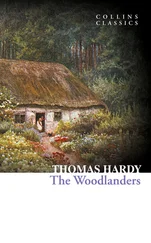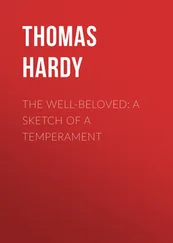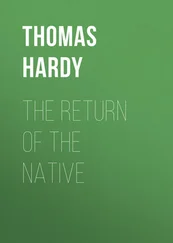"No, no, Jude!" she said quickly. "Don't reproach yourself with being what you are not. If anybody is to blame it is I."
"I supported you in your resolve to leave Phillotson; and without me perhaps you wouldn't have urged him to let you go."
"I should have, just the same. As to ourselves, the fact of our not having entered into a legal contract is the saving feature in our union. We have thereby avoided insulting, as it were, the solemnity of our first marriages."
"Solemnity?" Jude looked at her with some surprise, and grew conscious that she was not the Sue of their earlier time.
"Yes," she said, with a little quiver in her words, "I have had dreadful fears, a dreadful sense of my own insolence of action. I have thought—that I am still his wife!"
"Whose?"
"Richard's."
"Good God, dearest!—why?"
"Oh I can't explain! Only the thought comes to me."
"It is your weakness—a sick fancy, without reason or meaning! Don't let it trouble you."
Sue sighed uneasily.
As a set-off against such discussions as these there had come an improvement in their pecuniary position, which earlier in their experience would have made them cheerful. Jude had quite unexpectedly found good employment at his old trade almost directly he arrived, the summer weather suiting his fragile constitution; and outwardly his days went on with that monotonous uniformity which is in itself so grateful after vicissitude. People seemed to have forgotten that he had ever shown any awkward aberrancies: and he daily mounted to the parapets and copings of colleges he could never enter, and renewed the crumbling freestones of mullioned windows he would never look from, as if he had known no wish to do otherwise.
There was this change in him; that he did not often go to any service at the churches now. One thing troubled him more than any other; that Sue and himself had mentally travelled in opposite directions since the tragedy: events which had enlarged his own views of life, laws, customs, and dogmas, had not operated in the same manner on Sue's. She was no longer the same as in the independent days, when her intellect played like lambent lightning over conventions and formalities which he at that time respected, though he did not now.
On a particular Sunday evening he came in rather late. She was not at home, but she soon returned, when he found her silent and meditative.
"What are you thinking of, little woman?" he asked curiously.
"Oh I can't tell clearly! I have thought that we have been selfish, careless, even impious, in our courses, you and I. Our life has been a vain attempt at self-delight. But self-abnegation is the higher road. We should mortify the flesh—the terrible flesh—the curse of Adam!"
"Sue!" he murmured. "What has come over you?"
"We ought to be continually sacrificing ourselves on the altar of duty! But I have always striven to do what has pleased me. I well deserved the scourging I have got! I wish something would take the evil right out of me, and all my monstrous errors, and all my sinful ways!"
"Sue—my own too suffering dear!—there's no evil woman in you. Your natural instincts are perfectly healthy; not quite so impassioned, perhaps, as I could wish; but good, and dear, and pure. And as I have often said, you are absolutely the most ethereal, least sensual woman I ever knew to exist without inhuman sexlessness. Why do you talk in such a changed way? We have not been selfish, except when no one could profit by our being otherwise. You used to say that human nature was noble and long-suffering, not vile and corrupt, and at last I thought you spoke truly. And now you seem to take such a much lower view!"
"I want a humble heart; and a chastened mind; and I have never had them yet!"
"You have been fearless, both as a thinker and as a feeler, and you deserved more admiration than I gave. I was too full of narrow dogmas at that time to see it."
"Don't say that, Jude! I wish my every fearless word and thought could be rooted out of my history. Self-renunciation—that's everything! I cannot humiliate myself too much. I should like to prick myself all over with pins and bleed out the badness that's in me!"
"Hush!" he said, pressing her little face against his breast as if she were an infant. "It is bereavement that has brought you to this! Such remorse is not for you, my sensitive plant, but for the wicked ones of the earth—who never feel it!"
"I ought not to stay like this," she murmured, when she had remained in the position a long while.
"Why not?"
"It is indulgence."
"Still on the same tack! But is there anything better on earth than that we should love one another?"
"Yes. It depends on the sort of love; and yours—ours—is the wrong."
"I won't have it, Sue! Come, when do you wish our marriage to be signed in a vestry?"
She paused, and looked up uneasily. "Never," she whispered.
Not knowing the whole of her meaning he took the objection serenely, and said nothing. Several minutes elapsed, and he thought she had fallen asleep; but he spoke softly, and found that she was wide awake all the time. She sat upright and sighed.
"There is a strange, indescribable perfume or atmosphere about you to-night, Sue," he said. "I mean not only mentally, but about your clothes, also. A sort of vegetable scent, which I seem to know, yet cannot remember."
"It is incense."
"Incense?"
"I have been to the service at St. Silas', and I was in the fumes of it."
"Oh—St. Silas."
"Yes. I go there sometimes."
"Indeed. You go there!"
"You see, Jude, it is lonely here in the weekday mornings, when you are at work, and I think and think of—of my—" She stopped till she could control the lumpiness of her throat. "And I have taken to go in there, as it is so near."
"Oh well—of course, I say nothing against it. Only it is odd, for you. They little think what sort of chiel is amang them!"
"What do you mean, Jude?"
"Well—a sceptic, to be plain."
"How can you pain me so, dear Jude, in my trouble! Yet I know you didn't mean it. But you ought not to say that."
"I won't. But I am much surprised!"
"Well—I want to tell you something else, Jude. You won't be angry, will you? I have thought of it a good deal since my babies died. I don't think I ought to be your wife—or as your wife—any longer."
"What? … But you are !"
"From your point of view; but—"
"Of course we were afraid of the ceremony, and a good many others would have been in our places, with such strong reasons for fears. But experience has proved how we misjudged ourselves, and overrated our infirmities; and if you are beginning to respect rites and ceremonies, as you seem to be, I wonder you don't say it shall be carried out instantly? You certainly are my wife, Sue, in all but law. What do you mean by what you said?"
"I don't think I am!"
"Not? But suppose we had gone through the ceremony? Would you feel that you were then?"
"No. I should not feel even then that I was. I should feel worse than I do now."
"Why so—in the name of all that's perverse, my dear?"
"Because I am Richard's."
"Ah—you hinted that absurd fancy to me before!"
"It was only an impression with me then; I feel more and more convinced as time goes on that—I belong to him, or to nobody."
"My good heavens—how we are changing places!"
"Yes. Perhaps so."
Some few days later, in the dusk of the summer evening, they were sitting in the same small room downstairs, when a knock came to the front door of the carpenter's house where they were lodging, and in a few moments there was a tap at the door of their room. Before they could open it the comer did so, and a woman's form appeared.
"Is Mr. Fawley here?"
Читать дальше












